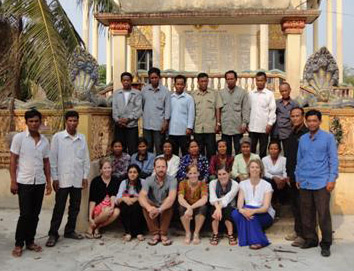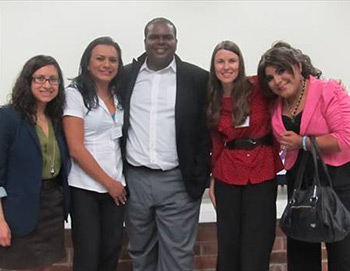By Leslie A. Gordon

prosecution of Khmer Rouge in Cambodia. In front
from left: Abbie Van Sickle ’11 (AJA), Saira Hussain ’13,
Nick Schrank ’13, Megan Karsh (AJA), Arusha
Gordon ’13, and Laurel Fletcher.
Fifteen years after its launch, the International Human Rights Law Clinic (IHRLC) is considered one of the leading human rights clinics in the country with three full-time instructors who oversee 25 students per semester. “The growth reflects the interests of students, the support from the school, and the alums and friends who fund us,” explained clinical professor Laurel E. Fletcher, now the clinic’s director. “We put students at the cutting edge of the human rights movement.”
Roxanna Altholz ’99, now the clinic’s associate director, was one of its first students. With family from Colombia, Altholz had witnessed first-hand the impact of armed conflict and pledged to forge a career in human rights. She chose to enroll at Berkeley Law specifically to gain practical experience with IHRLC.
The clinic’s mission matched her own: to promote human rights on behalf of individuals and marginalized communities at home and abroad; to develop innovative policy solutions; and to engage in vigorous advocacy—all with the ultimate goal of preparing graduates for law practice.
“I lived at the clinic,” recalled Altholz, who worked alongside seven other students and two faculty members on cases and projects. “It was the heart of my law school experience and really formed the foundation of my career.”
After graduating in 1999, Altholz – with encouragement from Fletcher, an early clinic faculty member – worked in Kosovo on a United Nations mission. Altholz later returned to the U.S. to represent death row inmates and then joined an organization suing governments responsible for human rights atrocities in Latin America. She came back to the IHRLC as an instructor in 2005. “One of the most important aspects of the clinic is the mentorship students receive. It extends beyond graduation,” she said.

of Guatemala’s civil war. In front from left: Roxanna
Altholz, Holly Dranginis ’13, Sonia Fleury ’13,
Carolina Solano LLM ’12, and Luz Gonzalez ’13.
Since the clinic’s inception, Fletcher has added programming to bring human rights home. “We want to domesticate human rights protections in the U.S. and in local communities,” she said. The clinic also seeks to promote a broader definition of who’s been victimized, such as the LGBT community in El Salvador and male survivors of conflict-related sexual violence in Uganda. “As a result, we’ve helped extend human rights to groups that have been overlooked and in the process opened up opportunities for our students to make a difference in the lives of human rights victims.”
Fletcher notes three high points among many from the clinic’s 15 years. The IHRLC won its very first case, which was related to discriminatory practices against children of Haitian ancestry in the Dominican Republic. “We made precedent with our victory,” Fletcher explained, “and it showed we could handle complex litigation at the highest level.”
Another highlight was the clinic’s work on behalf of Guantanamo detainees, who, Fletcher said, “were not convicted of any crimes, but got ensnared in the post-9-11 conflict.” The clinic’s work resulted in a book about the detainees’ experiences. “We made a contribution to an urgent issue and offered a perspective that had not received adequate attention.”
The IHRLC also obtained a ground-breaking judgment from the Inter-American Court of Human Rights (an arm of the Organization of American States) regarding forced disappearances during Guatemala’s civil war. The clinic litigated the case, with Altholz as the lead attorney, in partnership with a Guatemalan human rights organization. The Inter-American Court found that Guatemala had not only abducted, tortured and secretly executed individuals, but had also engaged in threats and intimidation of the victims’ families.

conference. From left: Lelia Gomez ‘14, Monica
Hernandez, Antonio Ingram ’14, IHRLC Instructor
Allison Davenport, Edwin Paty Hernandez.
Like Altholz, other clinic alums went on to rewarding careers in human rights law. Elise Keppler now works as associate director of the International Justice Program at Human Rights Watch. After graduating from Berkeley Law in 2001 and spending 18 months at a law firm, Keppler was so “desperate” to return to the human rights work that she quit her job and volunteered at Human Rights Watch until a paying position opened up.
“Working at the IHRLC was hugely formative for me,” Keppler said. “Because of my training at the clinic, I understand the need to be creative and strategic in formulating my responses to real world problems. From my perspective, the role of clinics in general, and human rights clinics in particular, are absolutely essential to the stature of the law school.”
Looking ahead to the clinic’s future, Fletcher is focused on “maintaining our vibrancy,” she said. “I want to focus on deepening the work we do and keeping on the frontier, the leading edge of the human rights movement.” Helping students secure human rights jobs upon graduation is a high priority for Fletcher.
For her part, Altholz believes the IHRLC offers “unparalleled opportunities” for students who want to work in the field. “They get the expert mentorship of the faculty, whose primary interest is the students’ success,” she said. “They teach students to undertake human rights cases with humility and ethics. That’s why students orbit around the clinic even after graduation: because of the high standard and the kinds of projects we do.”
The clinic’s 15th anniversary will be honored during Alumni Weekend with a panel discussion, “Bringing War Criminals to Justice,” on Saturday, Sept. 28, followed by a celebratory dinner.
Download the Powerpoint presentation
Watch the video: